Module 11 Way of life Unit 3 Language in use课件36张
文档属性
| 名称 | Module 11 Way of life Unit 3 Language in use课件36张 | 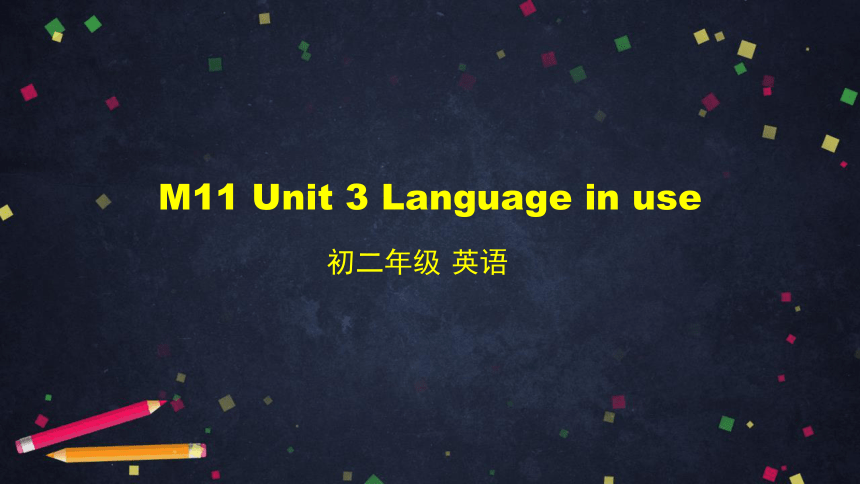 | |
| 格式 | pptx | ||
| 文件大小 | 2.8MB | ||
| 资源类型 | 教案 | ||
| 版本资源 | 外研版 | ||
| 科目 | 英语 | ||
| 更新时间 | 2021-02-20 17:08:22 | ||
图片预览

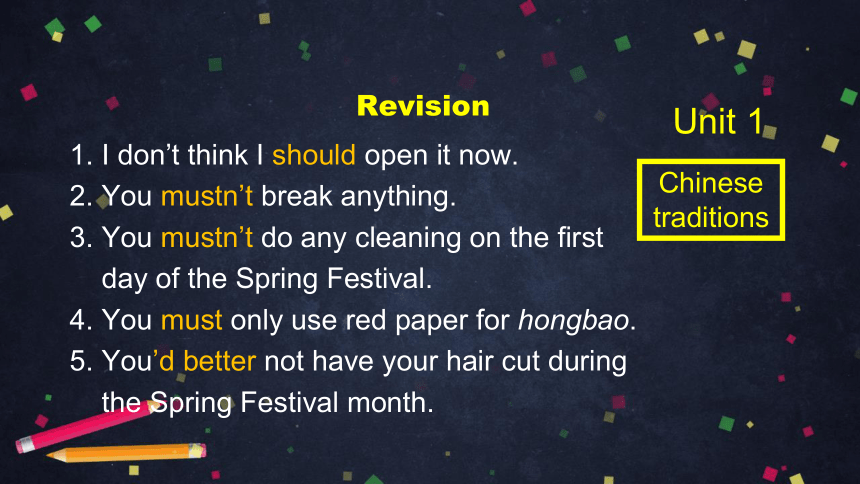
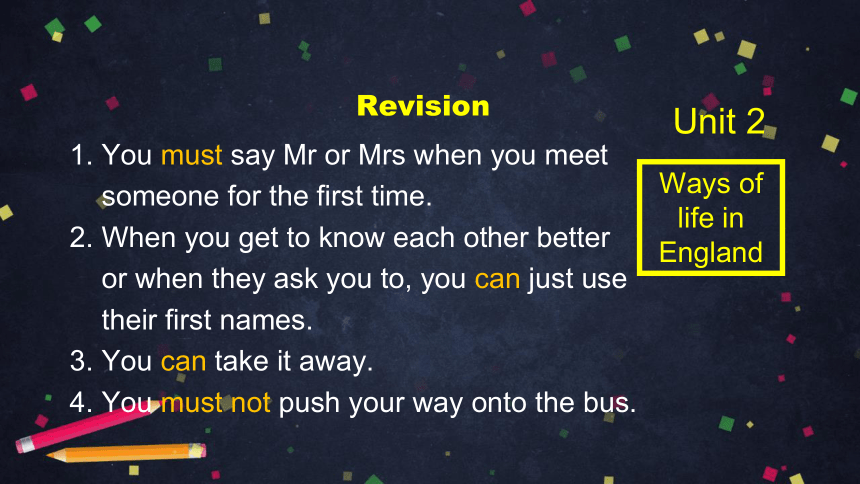
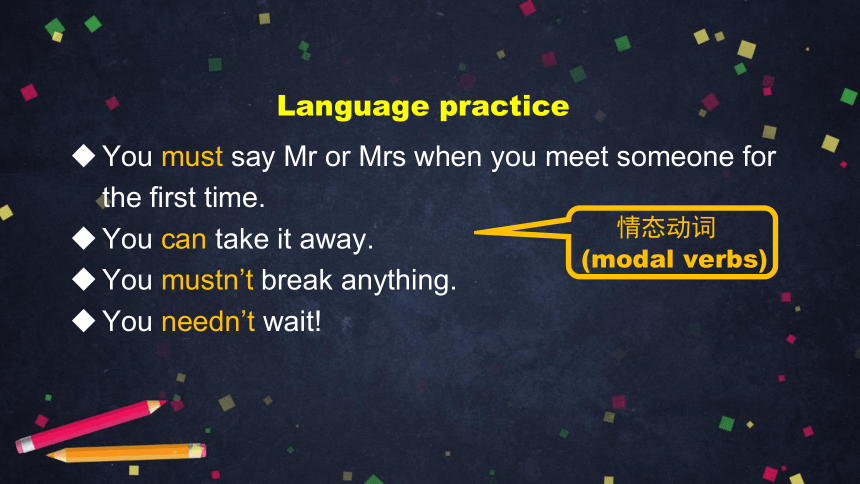
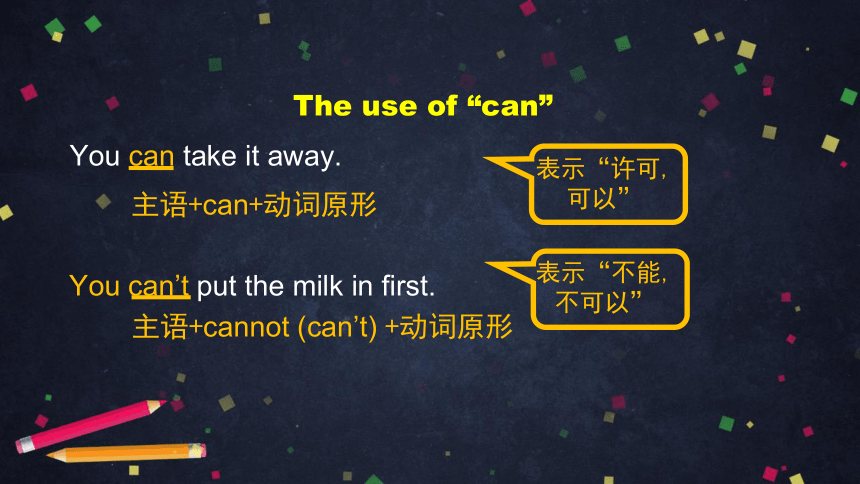
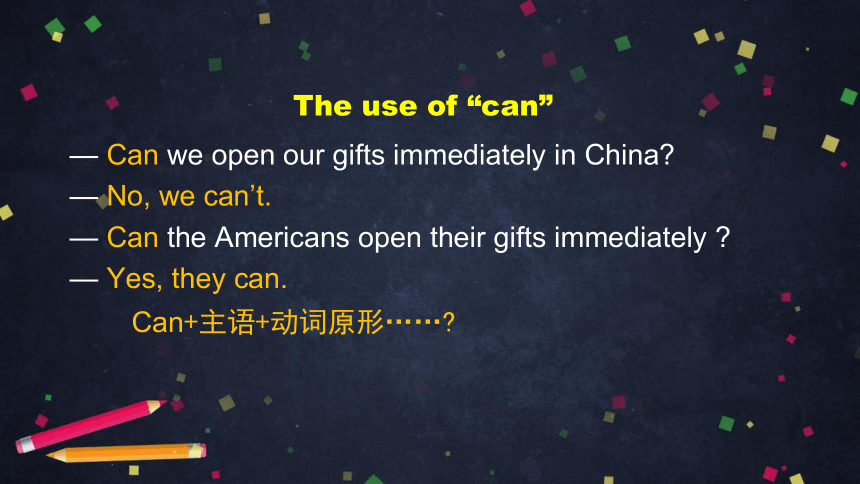

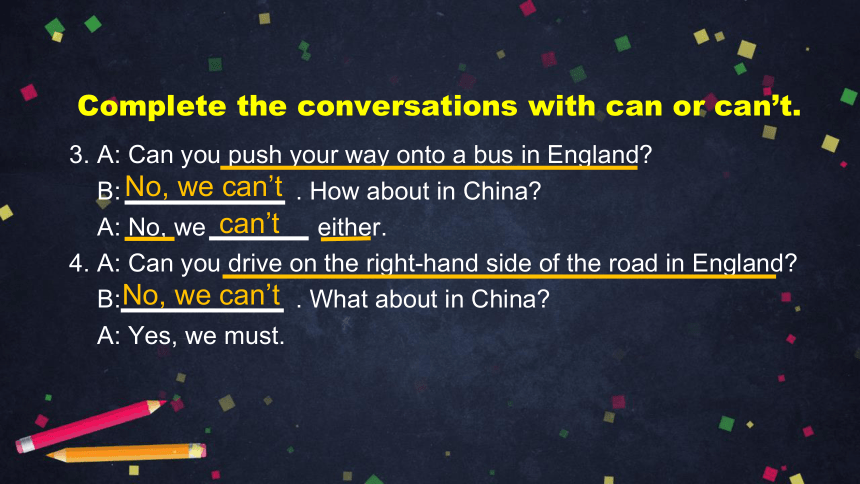
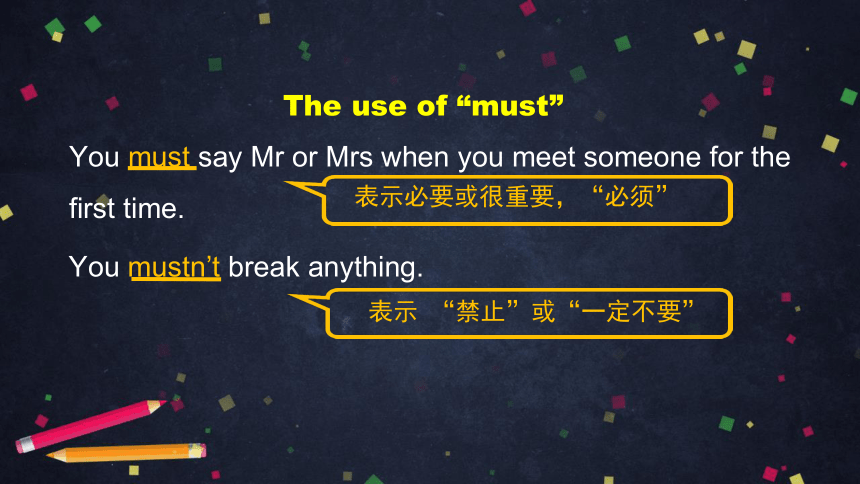
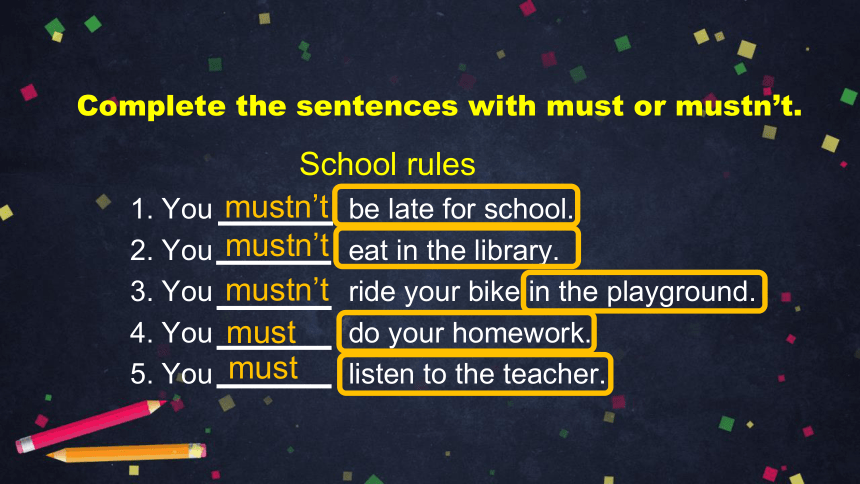
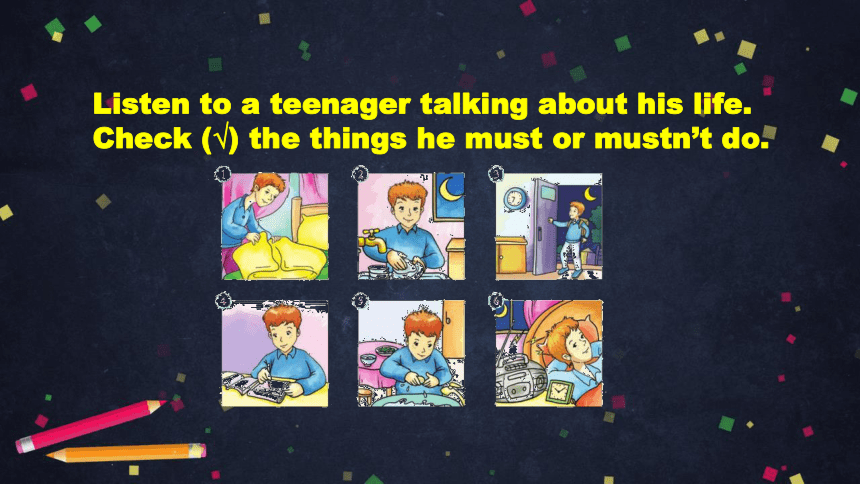
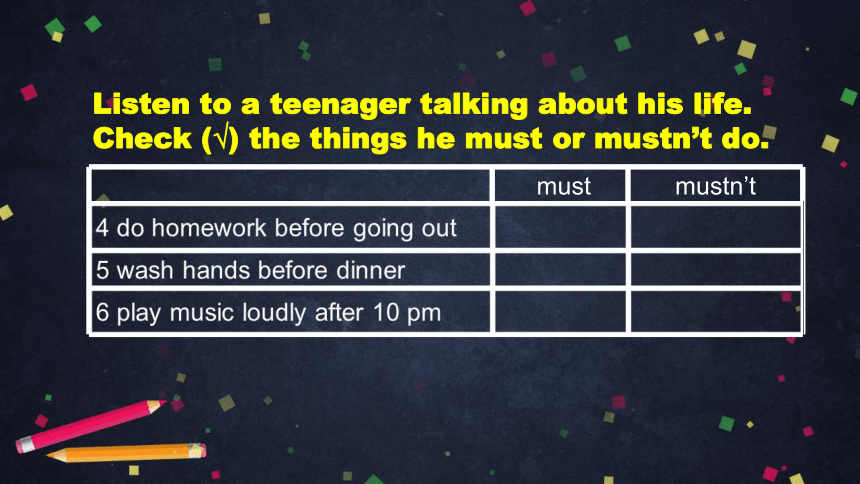
文档简介
M11 Unit 3 Language in use
初二年级 英语
1. I don’t think I should open it now.
2. You mustn’t break anything.
3. You mustn’t do any cleaning on the first
day of the Spring Festival.
4. You must only use red paper for hongbao.
5. You’d better not have your hair cut during
the Spring Festival month.
Unit 1
Chinese traditions
Revision
1. You must say Mr or Mrs when you meet
someone for the first time.
2. When you get to know each other better
or when they ask you to, you can just use
their first names.
3. You can take it away.
4. You must not push your way onto the bus.
Unit 2
Ways of life in England
Revision
You must say Mr or Mrs when you meet someone for the first time.
You can take it away.
You mustn’t break anything.
You needn’t wait!
Language practice
情态动词
(modal verbs)
The use of “can”
主语+can+动词原形
You can’t put the milk in first.
主语+cannot (can’t) +动词原形
表示“许可,可以”
You can take it away.
表示“不能,不可以”
— Can we open our gifts immediately in China?
— No, we can’t.
— Can the Americans open their gifts immediately ?
— Yes, they can.
The use of “can”
Can+主语+动词原形……?
1. A: Can you drive a car at the age of seventeen in England?
B: Yes, we . How about in China?
A: No, we .
2. A: Can you open a gift immediately after you receive it in
England?
B: . What about in China?
A: No, we usually don’t.
can
can’t
Yes , we can
Complete the conversations with can or can’t.
3. A: Can you push your way onto a bus in England?
B: . How about in China?
A: No, we either.
4. A: Can you drive on the right-hand side of the road in England?
B: . What about in China?
A: Yes, we must.
No, we can’t
can’t
No, we can’t
Complete the conversations with can or can’t.
You must say Mr or Mrs when you meet someone for the first time.
表示 “禁止”或“一定不要”
You mustn’t break anything.
表示必要或很重要,“必须”
The use of “must”
School rules
1. You be late for school.
2. You eat in the library.
3. You ride your bike in the playground.
4. You do your homework.
5. You listen to the teacher.
mustn’t
mustn’t
mustn’t
must
must
Complete the sentences with must or mustn’t.
Listen to a teenager talking about his life. Check (√) the things he must or mustn’t do.
Listen to a teenager talking about his life. Check (√) the things he must or mustn’t do.
{5C22544A-7EE6-4342-B048-85BDC9FD1C3A}
must
mustn’t
1 clean up bedroom once a week
2 wash up after dinner
3 stay out after 9 pm
Listen to a teenager talking about his life. Check (√) the things he must or mustn’t do.
{5C22544A-7EE6-4342-B048-85BDC9FD1C3A}
must
mustn’t
1 clean up bedroom once a week
2 wash up after dinner
3 stay out after 9 pm
Listen to a teenager talking about his life. Check (√) the things he must or mustn’t do.
{5C22544A-7EE6-4342-B048-85BDC9FD1C3A}
must
mustn’t
1 clean up bedroom once a week
2 wash up after dinner
3 stay out after 9 pm
√
√
“I must clean up my bedroom once a week and I must always wash up after dinner.”
Listen to a teenager talking about his life. Check (√) the things he must or mustn’t do.
{5C22544A-7EE6-4342-B048-85BDC9FD1C3A}
must
mustn’t
1 clean up bedroom once a week
2 wash up after dinner
3 stay out after 9 pm
√
√
√
“I mustn’t stay out after 9 o’clock at night.”
Listen to a teenager talking about his life. Check (√) the things he must or mustn’t do.
{5C22544A-7EE6-4342-B048-85BDC9FD1C3A}
must
mustn’t
4 do homework before going out
5 wash hands before dinner
6 play music loudly after 10 pm
√
√
“I must do my homework before I go out and I must wash my hands before dinner.”
Listen to a teenager talking about his life. Check (√) the things he must or mustn’t do.
{5C22544A-7EE6-4342-B048-85BDC9FD1C3A}
must
mustn’t
4 do homework before going out
5 wash hands before dinner
6 play music loudly after 10 pm
√
√
√
“…I mustn’t play music loudly after ten o’clock at night.”
{5C22544A-7EE6-4342-B048-85BDC9FD1C3A}
must
mustn’t
1 clean up bedroom once a week
2 wash up after dinner
3 stay out after 9 pm
√
√
√
Talk about his life
{5C22544A-7EE6-4342-B048-85BDC9FD1C3A}
must
mustn’t
4 do homework before going out
5 wash hands before dinner
6 play music loudly after 10 pm
√
√
√
Talk about his life
Listen again. What two things does he say
he can do?
1.
2.
1.
2.
He can go out with his friends at weekends.
“I mustn’t stay out after 9 o’clock at night, but I can go out with my friends at weekends.”
Listen again. What two things does he say
he can do?
1.
2.
He can go out with his friends at weekends.
He can play music .
“I can play music, but I mustn’t play it loudly after ten o’clock at night.”
Listen again. What two things does he say
he can do?
Talk about some things you can, must and mustn’t do at home.
You needn’t wait!
You need to stand in a line and wait your turn.
need的否定形式need not (needn’t)
表示“不需要”“不必要”
既可以作情态动词, 也可以作行为动词,
表示 “需要”常用于need to do sth.结构。
The use of “need”
Bring a map because you may want to travel around.
might为may的过去式,但也可以代替may,
表请求时语气更加婉转客气,表推测时更加不肯定。
May I come in?
① 表示请求或允许,在疑问
句中不用于第二人称。
② 表示推测可能性
(不是很确定)
The use of “may”
must 必须
mustn’t 禁止,一定不要
can 许可,可以can’t 不能,不可以
need 需要
needn’t 不必要
may 可以 ;可能
might 可以 ;也许
modal verbs情态动词
Summary
It is important to know what you must and must not do when you meet people from a different country.
You (1) may / must not ask Westerners “How old are you?” because it is not polite. You (2) might / can know someone well, but (3) you must / need not ask “How much money do you make?” He (4) may / can never speak to you again!
Underline the correct words.
In public places, you (5) must / can ask people before you take photos of them, and you (6) must not / might not eat or drink in shops or museums.
In some countries you (7) cannot / can go into someone’s house with your shoes on. You (8) need not / must not take them off. But in some other countries you (9) might / must not wear shoes in the house.
Underline the correct words.
Giving advice to foreign guests who are visiting a Chinese family
Module task
Module task
Write some advice for foreign visitors to a Chinese family. Think about:
What must they wear?
What mustn’t they talk about?
What can’t they do?
What presents can they bring?
When must they arrive?
…
Module task
They must arrive on time or a little earlier.
They can shake hands and say hello.
Show the advice you wrote in Activity 9.
Module task
They can bring a bottle of wine or some flowers.
They mustn’t give a clock to the host as a gift.
Show the advice you wrote in Activity 9.
Module task
They needn’t eat up all the food on the plate.
They need accept gifts with both hands.
Show the advice you wrote in Activity 9.
Module task
Put the pieces of advice together and send it to your foreign friends.
Here is some advice for the foreigners who are visiting a Chinese family. First of all, they must arrive on time or a little earlier. As for gifts, they can bring a bottle of wine or some flowers, but they mustn’t give a clock. When they are having dinner, they needn’t eat up all the food on the plate.
Homework
1. 运用适当的情态动词谈论自家的家规家训;
2. 为来中国家庭做客的外国人,写下一些关于中国习俗的建议;
3. 阅读Around the world,学习他国的风俗习惯。
Thank you!
初二年级 英语
1. I don’t think I should open it now.
2. You mustn’t break anything.
3. You mustn’t do any cleaning on the first
day of the Spring Festival.
4. You must only use red paper for hongbao.
5. You’d better not have your hair cut during
the Spring Festival month.
Unit 1
Chinese traditions
Revision
1. You must say Mr or Mrs when you meet
someone for the first time.
2. When you get to know each other better
or when they ask you to, you can just use
their first names.
3. You can take it away.
4. You must not push your way onto the bus.
Unit 2
Ways of life in England
Revision
You must say Mr or Mrs when you meet someone for the first time.
You can take it away.
You mustn’t break anything.
You needn’t wait!
Language practice
情态动词
(modal verbs)
The use of “can”
主语+can+动词原形
You can’t put the milk in first.
主语+cannot (can’t) +动词原形
表示“许可,可以”
You can take it away.
表示“不能,不可以”
— Can we open our gifts immediately in China?
— No, we can’t.
— Can the Americans open their gifts immediately ?
— Yes, they can.
The use of “can”
Can+主语+动词原形……?
1. A: Can you drive a car at the age of seventeen in England?
B: Yes, we . How about in China?
A: No, we .
2. A: Can you open a gift immediately after you receive it in
England?
B: . What about in China?
A: No, we usually don’t.
can
can’t
Yes , we can
Complete the conversations with can or can’t.
3. A: Can you push your way onto a bus in England?
B: . How about in China?
A: No, we either.
4. A: Can you drive on the right-hand side of the road in England?
B: . What about in China?
A: Yes, we must.
No, we can’t
can’t
No, we can’t
Complete the conversations with can or can’t.
You must say Mr or Mrs when you meet someone for the first time.
表示 “禁止”或“一定不要”
You mustn’t break anything.
表示必要或很重要,“必须”
The use of “must”
School rules
1. You be late for school.
2. You eat in the library.
3. You ride your bike in the playground.
4. You do your homework.
5. You listen to the teacher.
mustn’t
mustn’t
mustn’t
must
must
Complete the sentences with must or mustn’t.
Listen to a teenager talking about his life. Check (√) the things he must or mustn’t do.
Listen to a teenager talking about his life. Check (√) the things he must or mustn’t do.
{5C22544A-7EE6-4342-B048-85BDC9FD1C3A}
must
mustn’t
1 clean up bedroom once a week
2 wash up after dinner
3 stay out after 9 pm
Listen to a teenager talking about his life. Check (√) the things he must or mustn’t do.
{5C22544A-7EE6-4342-B048-85BDC9FD1C3A}
must
mustn’t
1 clean up bedroom once a week
2 wash up after dinner
3 stay out after 9 pm
Listen to a teenager talking about his life. Check (√) the things he must or mustn’t do.
{5C22544A-7EE6-4342-B048-85BDC9FD1C3A}
must
mustn’t
1 clean up bedroom once a week
2 wash up after dinner
3 stay out after 9 pm
√
√
“I must clean up my bedroom once a week and I must always wash up after dinner.”
Listen to a teenager talking about his life. Check (√) the things he must or mustn’t do.
{5C22544A-7EE6-4342-B048-85BDC9FD1C3A}
must
mustn’t
1 clean up bedroom once a week
2 wash up after dinner
3 stay out after 9 pm
√
√
√
“I mustn’t stay out after 9 o’clock at night.”
Listen to a teenager talking about his life. Check (√) the things he must or mustn’t do.
{5C22544A-7EE6-4342-B048-85BDC9FD1C3A}
must
mustn’t
4 do homework before going out
5 wash hands before dinner
6 play music loudly after 10 pm
√
√
“I must do my homework before I go out and I must wash my hands before dinner.”
Listen to a teenager talking about his life. Check (√) the things he must or mustn’t do.
{5C22544A-7EE6-4342-B048-85BDC9FD1C3A}
must
mustn’t
4 do homework before going out
5 wash hands before dinner
6 play music loudly after 10 pm
√
√
√
“…I mustn’t play music loudly after ten o’clock at night.”
{5C22544A-7EE6-4342-B048-85BDC9FD1C3A}
must
mustn’t
1 clean up bedroom once a week
2 wash up after dinner
3 stay out after 9 pm
√
√
√
Talk about his life
{5C22544A-7EE6-4342-B048-85BDC9FD1C3A}
must
mustn’t
4 do homework before going out
5 wash hands before dinner
6 play music loudly after 10 pm
√
√
√
Talk about his life
Listen again. What two things does he say
he can do?
1.
2.
1.
2.
He can go out with his friends at weekends.
“I mustn’t stay out after 9 o’clock at night, but I can go out with my friends at weekends.”
Listen again. What two things does he say
he can do?
1.
2.
He can go out with his friends at weekends.
He can play music .
“I can play music, but I mustn’t play it loudly after ten o’clock at night.”
Listen again. What two things does he say
he can do?
Talk about some things you can, must and mustn’t do at home.
You needn’t wait!
You need to stand in a line and wait your turn.
need的否定形式need not (needn’t)
表示“不需要”“不必要”
既可以作情态动词, 也可以作行为动词,
表示 “需要”常用于need to do sth.结构。
The use of “need”
Bring a map because you may want to travel around.
might为may的过去式,但也可以代替may,
表请求时语气更加婉转客气,表推测时更加不肯定。
May I come in?
① 表示请求或允许,在疑问
句中不用于第二人称。
② 表示推测可能性
(不是很确定)
The use of “may”
must 必须
mustn’t 禁止,一定不要
can 许可,可以can’t 不能,不可以
need 需要
needn’t 不必要
may 可以 ;可能
might 可以 ;也许
modal verbs情态动词
Summary
It is important to know what you must and must not do when you meet people from a different country.
You (1) may / must not ask Westerners “How old are you?” because it is not polite. You (2) might / can know someone well, but (3) you must / need not ask “How much money do you make?” He (4) may / can never speak to you again!
Underline the correct words.
In public places, you (5) must / can ask people before you take photos of them, and you (6) must not / might not eat or drink in shops or museums.
In some countries you (7) cannot / can go into someone’s house with your shoes on. You (8) need not / must not take them off. But in some other countries you (9) might / must not wear shoes in the house.
Underline the correct words.
Giving advice to foreign guests who are visiting a Chinese family
Module task
Module task
Write some advice for foreign visitors to a Chinese family. Think about:
What must they wear?
What mustn’t they talk about?
What can’t they do?
What presents can they bring?
When must they arrive?
…
Module task
They must arrive on time or a little earlier.
They can shake hands and say hello.
Show the advice you wrote in Activity 9.
Module task
They can bring a bottle of wine or some flowers.
They mustn’t give a clock to the host as a gift.
Show the advice you wrote in Activity 9.
Module task
They needn’t eat up all the food on the plate.
They need accept gifts with both hands.
Show the advice you wrote in Activity 9.
Module task
Put the pieces of advice together and send it to your foreign friends.
Here is some advice for the foreigners who are visiting a Chinese family. First of all, they must arrive on time or a little earlier. As for gifts, they can bring a bottle of wine or some flowers, but they mustn’t give a clock. When they are having dinner, they needn’t eat up all the food on the plate.
Homework
1. 运用适当的情态动词谈论自家的家规家训;
2. 为来中国家庭做客的外国人,写下一些关于中国习俗的建议;
3. 阅读Around the world,学习他国的风俗习惯。
Thank you!
同课章节目录
- Module 1 How to learn English
- Unit 1 Let's try to speak English as much as possi
- Unit 2 You should smile at her.
- Unit 3 Language in use .
- Module 2 My home town and my country
- Unit 1 It's taller than many other buildings.
- Unit 2 Cambridge is a beautiful city in the east o
- Unit 3 Language in use .
- Module 3 Sports.
- Unit 1 Nothing is more exciting than playing tenni
- Unit 2 This year we training more carefully.
- Unit 3 Language in use .
- Module 4 Planes, ships and trains .
- Unit 1 He lives the farthest from school.
- Unit 2 What is the best way to travel.
- Unit 3 Language in use .
- Module 5 Lao She Teahouse.
- Unit 1 I wanted to see the Beijing Opera.
- Unit 2 It descibes the changes in Chinese society.
- Unit 3 Language in use .
- Module 6 Animals in danger.
- Unit 1 It allows people to get closer to them .
- Unit 2 The WWF is working hard to save them all.
- Unit 3 Language in use .
- Revision module A
- Module 7 A famous story
- Unit 1 Alice was sitting with her sister by the ri
- Unit 2 She was thinking about her cat.
- Unit 3 Language in use .
- Module 8 Accidents
- Unit 1 While the car were changing to red, a car s
- Unit 2 I was trying to pick it up when it bite me
- Unit 3 Language in use .
- Module 9 Population
- Unit 1 The population of China is about 1.37 billi
- Unit 2 Arnwick was a city with 200,000 people.
- Unit 3 Language in use .
- Module 10 The weathe
- Unit 1 It might snow.
- Unit 2 The weather is fine all year round.
- Unit 3 Language in use .
- Module 11 Way of life
- Unit 1 In China ,we open a gift later.
- Unit 2 In England, you usually drink tea with milk
- Unit 3 Language in use .
- Module 12 Help
- Unit 1 What should we do before help arrives?
- Unit 2 Stay away from windows and heavy furniture.
- Unit 3 Language in use .
- Revision module B
